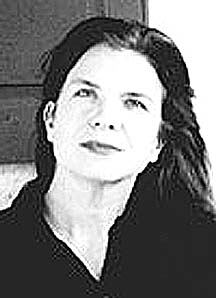

Lee Upton Inspires Audience with Charismatic Poetry
by Blake Rehberg
Poet and critic Lee Upton amused the crowd in King on Tuesday with her sheer energy and lively wit, bringing an amiable attitude to the second event of the Creative Writing Program's reading series for the semester.
Introduced as the poet who "has done it all" by Professor of Creative Writing Sylvia Watanabe, Upton read from Civilian Histories, the latest of her four books of poetry. It was published this year by the University of Georgia Press after being selected as a winner in the Georgia Contemporary Poetry Series. Upton has also written literary criticism and short fiction and is a teacher at Lafayette College.
"Lee brings her unique imagination to everything she does," Watanabe said. "Her poetry while meticulously considered and crafted, is always explorative, adventurous, rhapsodic and acutely aware of the strangeness of things." The reading proved just that, and it is obvious that Upton has an abundance of material for her poems because of her ability to see revelation or enlightenment in the ordinary actions of everyday life. She uses this with her talented imagination and produces an insight all her own.
In "The Milking Parlor" and "The Governesses," Upton draws on early childhood memories of her father and milking cows and ordinary experiences with governesses as a source of poetic material. She uses her talent to show the sadness of decaying passion and hard work in "Library Sale." She is able to transform an event that would go unnoticed by most people into something striking and moving. Upton changes things that most people would rather ignore, such a fear of flying in her poem, "Flight Over Islands," into something emotionally engaging.

|
|
A Poet's Life: Upton's Reading was the second of the Creative Writing Department's Series (photo courtesy of Upton) |
Not only is she able to draw ideas from common experience but also she is able to portray meaningful insight in these poems. In "The Trying People," she draws on her family history and experience to create a poem dealing with the benefit of personal effort. She shows the importance of family and the folly of placing importance in other material things in her poem "Asiatic Lily."
Upton also possesses a vibrant imagination to inspire other poems. Poems like "The Family Tree in Hell" are roused completely from herself, and it is a quite humorous and original concept. She is able to pull the poem "Women with Cherubs" from envisioning an idea to accompany common motifs in renaissance paintings.
Proving that her imagination is a commodity able to produce more than two random poems, she writes of a dialogue with God in "Thanking You isn't Enough." With a flair of true creativity, she reinterprets a common children's story in "The Ugly Duckling."
Besides the insightful and high quality poems that she read for the crowd that gathered, she entertained with her sense of humor. She preceded almost every poem with an anecdote to help explain the poems and more often than not was very funny. She also included humor in her poems. The crowd responded especially to "Thanking You isn't Enough" and "The Meaning of Coffee in Countless Westerns."
Upton combined her insight into the ordinary and her imagination to produce poems that were perceptive or humorous and sometimes both. She prefaced each with explanatory notes which helped with what otherwise would have been complex and possibly puzzling poems. The combination of all these qualities made the reading both pleasant and inspiring.
Copyright © 2000, The Oberlin Review.
Volume 128, Number 17, March 10, 2000
Contact us with your comments and suggestions.
|
News
|
Perspectives
|
|
|
Arts
|
Sports
|
Other
|